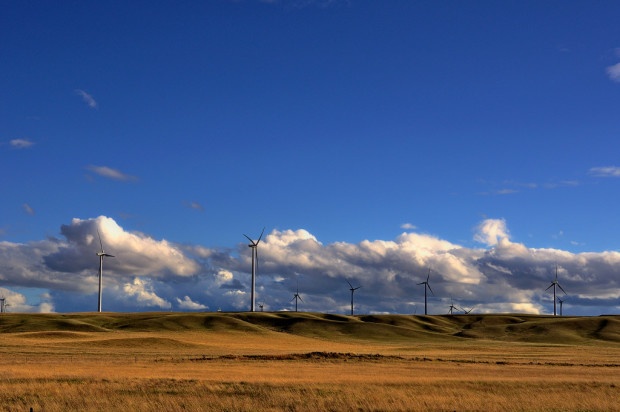We have much more to do and your continued support is needed now more than ever.
Budget Cuts in Energy Programs Undermine Wildlife

Budgets reflect priorities and values. On renewable energy and science, the Administration’s proposed budget reflect the wrong priorities and the wrong values for wildlife.
Instead of continuing and growing investment in widely popular renewable energy, the budget proposes drastic cuts and elimination of programs designed to promote innovation and development of this burgeoning industry that is helping wildlife, reducing pollution and rapidly creating jobs.
Renewable Energy is a Good and Needed Investment
While coal production and demand have both declined about 30% over the last five years due largely to its increasing lack of competitiveness, growth in renewable energy development has been booming. Between 2008 and 2016, wind energy costs have declined by more than a third and there has been a three-fold increase in wind. Meanwhile, solar photovoltaic prices have dropped 85% over the same period and solar generation has expanded 40 times during that period. As a result, job growth has exploded, with wind employing about 100,000 people and solar employing 260,000 people. By comparison, coal employs about 70,000 people.
Despite this growth, renewables still only comprise about 15% of America’s electric energy generation, with about 7% coming from solar and wind power. While this an enormous jump over figures even half a decade ago, it is still well short of what is needed to reach to reduction goals that will avert catastrophic levels of warming – an 80-90% reduction in economy wide emissions by 2050 .
In order to achieve the pace and scale of clean energy progress needed, much more must be done. One of the things we must do is to continue to accelerate the renewable energy revolution by making smart investments in energy innovation, including in technologies that are not far enough along to attract private investment.
A Budget That Undermines Wildlife

The Administration’s budget seeks to pull the rug out from under federal support of renewable energy progress.
Specifically, here’s how the budget, if passed, would erode our chance to advance climate solutions that help wildlife, showcase American innovation, and increase our worldwide competitiveness.
-
Grants would end to states to implement the Clean Power Plan, the first ever and legally required federal plan to reduce carbon pollution from our power sector. This is part of a broader effort to repeal or greatly weaken this plan that would cut greenhouse gas pollution from the power sector by at least 30% by 2030, result in less pollution, and boost more clean energy innovation, development, and jobs.
-
Funding for the Department of Energy’s Office of Energy Efficiency and Renewable Energy (EERE) would be cut by 70 percent, dramatically reducing research advancing climate solutions.
-
The Department of Energy’s Advanced Research Projects Agency, which works on renewable energy solutions that are often times too new for private sector investment (e.g. battery storage technology) would be zeroed out.
-
The U.S. EPA’s Greenhouse Gas reporting program, which requires reporting of greenhouse gas data and other relevant information from large GHG emission sources, fuel and industrial gas suppliers, and carbon dioxide injection sites in the United States, would be cut almost 90%.
-
Successful voluntary EPA energy savings programs ENERGY STAR and the Natural Gas STAR would be eliminated.
-
The Department of Interior’s abandoned mine land grants program, which helps Appalachian States with economic development in conjunction with abandoned coal mine reclamation, would be eliminated.
-
The budget would eliminate a loan guarantee program for innovative technology and an advanced vehicle technology manufacturing program.
-
Cuts are proposed in funding to the Department of Interior’s Bureau of Ocean Energy Management would will hinder its ability to advance permitting and research initiatives that help advance offshore wind power, a clean energy source which is poised to make substantial gains in the coming years.
In addition to these cuts, the budget seeks to sell off immense U.S. resources, including massively expanded fossil fuel development on public lands, oil in the remote and largely untouched Arctic National Wildlife Refuge and massive pieces of western grid infrastructure, to generate revenue. This will spur more polluting development and likely increase electricity rates for consumers.
These cuts hurt states too. For instance, the budget would take away about $3.5 billion of Department of Energy money to states. It eliminates over 17,000 scientists’ jobs in states and costs state about $8.3 billion of annual growth.
The proposed cuts to renewable energy research and development have already elicited bi-partisan objection, including a letter from six Senate Republicans stating that, “We cannot lose the technological advantages we have gained through our country’s investment in research and development.”

Losses for Wildlife
The losers in the Administration’s budget are clear: wildlife, the public, and communities. These targeted investments help protect our natural resources for the long term and drive American economic progress.
Less pollution due to renewable energy advancement means that the $887 billion outdoor economy can continue to thrive. It means more jobs in rural communities that are rich in wind and solar resources. It means that drinking water supplies like Lake Erie will have fewer toxic algal blooms. It means healthier streams with more trout, forests with fewer fires and more wildlife, cleaner lakes and streams. And it means jobs that are good for families, communities and the planet.
These investments being targeted for massive cuts or elimination promote a more promising future for our children. They benefit us all and they reflect the bi-partisan values of conservation, innovation and caring for our children and the world we will pass on to them. The drastic cuts proposed do not reflect these values and needs, and should be rejected by Congress.





















